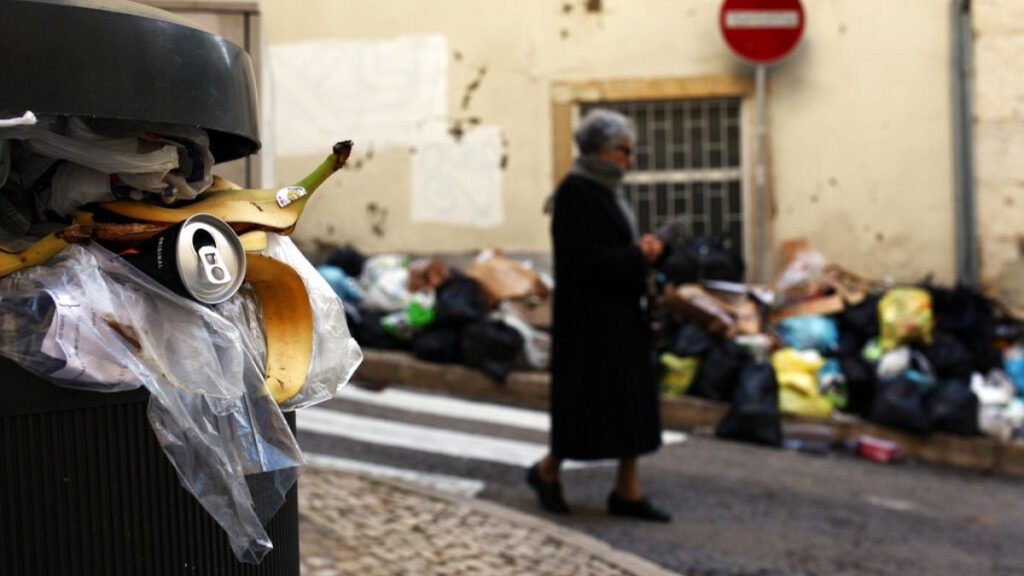Lisbon, Portugal’s vibrant capital, is currently grappling with a mounting waste crisis as a two-day strike by waste collection workers leaves piles of uncollected garbage strewn across the city, coinciding with the peak waste generation period of the festive season. The strike, organized by the Municipal Workers Union of Lisbon (STML) and the Local Administration Workers Union (STAL), underscores the escalating tensions between the city’s waste management workforce and the administration of Mayor Carlos Moedas. Residents have voiced their frustration and criticism on social media, accusing the mayor’s office of mismanaging the situation and failing to adequately address the long-standing concerns of the sanitation workers. The festive season, typically a time of heightened waste generation, has only exacerbated the crisis, transforming the city’s picturesque streets into unsightly landscapes of overflowing bins and scattered refuse.
The striking workers, represented by STML and STAL, are demanding improved working conditions, including upgrades to worker facilities and the provision of proper meal spaces, as stipulated in a June 2023 agreement with the city council. They accuse the council of failing to honor these commitments, contributing to an increasingly strained relationship between the workers and the administration. Furthermore, the unions have expressed strong disapproval of the council’s decision to outsource cleaning services to private companies, a move they deem “unacceptable.” This outsourcing decision has further fueled the workers’ discontent, adding another layer of complexity to the already tense situation. The unions argue that the outsourcing strategy undermines the job security and working conditions of existing municipal sanitation workers.
The city council, acknowledging the severity of the situation, has deployed additional waste bins across Lisbon in an attempt to mitigate the impact of the strike. However, these measures are acknowledged as temporary fixes, insufficient to fully address the rapidly accumulating waste problem. City officials have urged residents to minimize waste generation and avoid leaving unnecessary rubbish on the streets, recognizing that the current waste management system is overwhelmed. The strike’s timing during the festive season, when waste generation typically increases, puts immense pressure on the city’s infrastructure and resources.
The two unions spearheading the strike, STML and STAL, have announced further industrial action, including a full strike on December 26 and 27, an overtime ban between Christmas and New Year’s Eve, and another strike impacting both normal and overtime work from the evening of January 1st to the morning of January 2nd. This planned escalation of industrial action underscores the unions’ resolve to secure their demands and signifies a deepening of the conflict between the workers and the city administration. The prolonged disruption caused by these strikes threatens to further exacerbate the city’s waste crisis and disrupt essential services during a crucial period.
The STML, in its statement, has criticized the council’s failure to implement the commitments made in the June 2023 agreement, emphasizing the lack of action on upgrading worker facilities and providing adequate meal spaces. The union also denounces the outsourcing of cleaning services, characterizing it as a detrimental decision that undermines the workforce and disregards the importance of maintaining a robust public sanitation service. This critique highlights the core issues driving the workers’ discontent: the perceived neglect of their working conditions and the threat to their job security posed by outsourcing.
While the city council acknowledges delays in fulfilling some of the demands outlined in the June 2023 agreement, it insists that progress is being made and that all commitments will eventually be implemented. However, this assurance has failed to appease the striking workers and their unions, who maintain that the lack of tangible improvements to their working conditions and the continued pursuit of outsourcing are unacceptable. The ongoing standoff highlights a fundamental disagreement between the workers and the administration regarding the prioritization of worker welfare and the long-term strategy for managing the city’s waste. The strike continues to disrupt daily life in Lisbon, leaving residents to contend with the growing piles of uncollected garbage and raising concerns about public health and sanitation.














